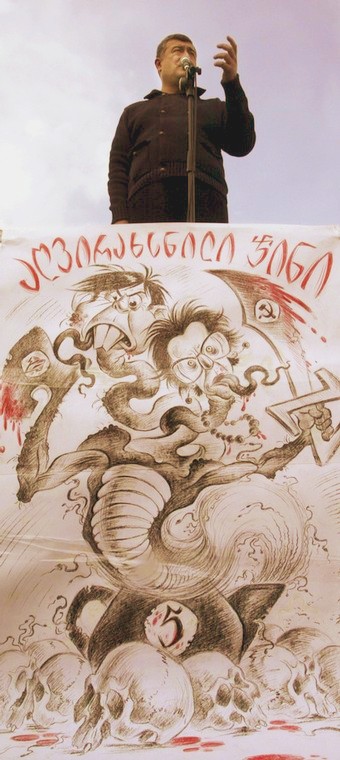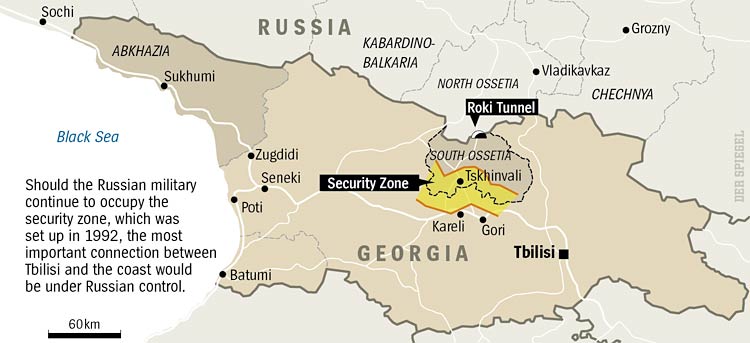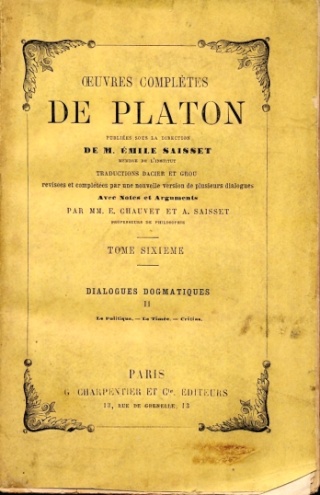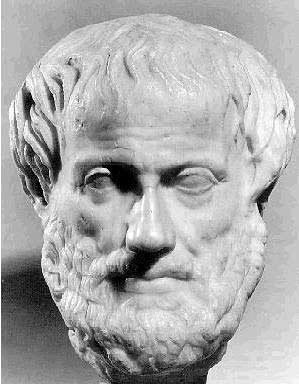Le plus cocasse dans l'histoire de cette guerre, c'est ce constat donné par le Spiegel : les Géorgiens avaient des difficultés pour utiliser leur matériel militaire. De fabriquation américaine, ils n'y sont pas encore assez habitués. C'est ainsi que bien que l'unique unité russe présente dans le nord de l'Ossétie avant le début du conflit, unité que les observateurs Otan disent ne pas avoir été prête au combat (donc pas de prévision de combat, pas d'attaque planifiée) n'a pas été écrasée par les milliers de soldats Géorgiens envahissant ce pays ami de la Russie et à la population majoritairement d'origine russe.
09/15/2008 12:00 AM
DID SAAKASHVILI LIE?
The West Begins to Doubt Georgian Leader
http://www.spiegel.de/international/world/0,1518,578273,00.html
By SPIEGEL Staff
Five weeks after the war in the Caucasus the mood is shifting against Georgian President Saakashvili. Some Western intelligence reports have undermined Tbilisi's version of events, and there are now calls on both sides of the Atlantic for an independent investigation.
Hillary Clinton looks tired. It is Tuesday of last week as she sits, exhausted, in the United States Senate. Even her outfit, a beige blazer over a black T-shirt, looks washed out.
Gone is the glamour of the Democratic Convention in Denver, where the party nominated Barack Obama as its presidential candidate, and gone is the dream of her own presidential candidacy in 2008. Instead, it's back to business as usual for Clinton. The Senate Armed Service Committee is in session, discussing the conflict between Russia and its tiny neighbor, Georgia.
Clinton speaks late in the debate. Even her voice sounds tired. But politically she is still her old self, and she cuts right to the chase.
"Did we embolden the Georgians in any way" to use military force? she asks the members of the committee. Did the Bush administration really warn Moscow and Georgia sufficiently about the consequences of a war? And how could it be that the United States was so taken by surprise by this outbreak of hostilities? These questions, says Clinton, should be examined by a US commission, which should "in the first place determine the actual facts."
Although Clinton speaks for only a few minutes, her words show that the mood toward Georgia is shifting in the United States.
For Americans, wasn't this war in the faraway Caucasus -- over there in the Old World -- nothing but a struggle between a giant, expansionist country and a small, democratic nation it was seeking to subjugate? And wasn't Georgia attacked merely "because we want to be free," as President Mikhail Saakashvili was saying in front of CNN's cameras almost hourly?
"Today, we are all Georgians," Republican presidential candidate John McCain declared. The neoconservative commentator Robert Kagan compared the Russian action with the Nazis' 1938 invasion of the Sudetenland region of Czechoslovakia. And in a meeting with US Vice President Richard Cheney, Saakashvili was assured of Washington's support for his most fervent wish: admission to NATO.
But now, five weeks after the end of the war in the Caucasus, the winds have shifted in America. Even Washington is beginning to suspect that Saakashvili, a friend and ally, could in fact be a gambler -- someone who triggered the bloody five-day war and then told the West bold-faced lies. "The concerns about Russia have remained," says Paul Sanders, an expert on Russia and the director of the conservative Nixon Center in Washington. His words reflect the continuing Western assessment that Russia's military act of revenge against the tiny Caucasus nation Georgia was disproportionate, that Moscow violated international law by recognizing the separatist republics of South Ossetia and Abkhazia and, finally, that it used Georgia as a vehicle to showcase its imperial renaissance.
But then Saunders qualifies his statement: "More and more people are realizing that there are two sides in this conflict, and that Georgia was not as much a victim as a willing participant." Members of US President George W. Bush's administration, too, are reconsidering their position. Georgia "marched into the South Ossetian capital" after a series of provocations, says Assistant Secretary of State for European and Eurasian Affairs Daniel Fried.
Does this suggest that America's pronouncements of solidarity with Saakashvili were just as premature as those of the Europeans? British Prime Minister Gordon Brown had called for a "radical" review of relations with Moscow, Swedish Foreign Minister Carl Bildt decried what he called a violation of international law, and German Chancellor Angela Merkel promised Georgia that, at some point, it would "become a member of NATO, if it so wishes."
But now the volume is being turned down on the anti-Moscow rhetoric. Last week German Foreign Minister Frank-Walter Steinmeier publicly called for clarification on the question of who is to blame for the Caucasus war. "We do need to know more about who bears what portion of the responsibility for the military escalation and to what extent," Steinmeier told a meeting of Germany's more than 200 ambassadors in Berlin. The European Union, he said, must now "define our relations with the parties to the conflict for the medium and long term," and that the time has come to have concrete information.
Which Side Launched the First Strikes?
Much depends on the clarification of this question of blame. After this war, the West must ask itself whether it truly wants to accept a country like Georgia into NATO, especially if this means having to intervene militarily in the Caucasus if a similar conflict arises. And what sort of partnership should it seek in the future with Russia, which, for the first time, has now become as insistent as the United States on protecting its spheres of influence?
The attempt to reconstruct the five-day war in August continues to revolve around one key question: Which side was the first to launch military strikes? Information coming from NATO and the Organization for Security and Cooperation in Europe (OSCE) now paints a different picture than the one that prevailed during the first days of the battle for the South Ossetian capital Tskhinvali -- and is fueling the doubts of Western politicians.
The Georgian government continues to maintain that the war began on Thursday, Aug. 7, at 11:30 p.m. According to its account, it was at this time that it received several intelligence reports that approximately 150 Russian army vehicles had entered Georgian territory, in the separatist republic of South Ossetia, through the Roki Tunnel, which passes under the main Caucasus ridge. Their objective, say the Georgians, was Tskhinvali, and additional military columns followed beginning at 3 a.m.
"We wanted to stop the Russian troops before they could reach Georgian villages," Saakashvili told SPIEGEL recently, explaining the marching orders that were given to his army. "When our tanks moved toward Tskhinvali, the Russians bombed the city. They were the ones -- not us -- who reduced Tskhinvali to rubble." But reports by the OSCE describe a different situation in those critical hours.
The OSCE maintains a mission in South Ossetia, which was caught between the fronts when the war erupted. According to a so-called spot report that OSCE officials wrote at 11 a.m. Georgian time on Aug. 8: "Shortly before midnight, central Tskhinvali came under heavy fire and shelling, with some of it presumably coming from launching pads and artillery stationed outside the conflict zone. The Tskhinvali office of the mission was hit, and the three remaining international employees sought shelter in the basement."
Spot reports are sent regularly to the Vienna offices of the 56 OSCE member states. The Aug. 8 report is kept neutral, a reflection of the fact that both Georgia and Russia are members of the organization, so that the information it contains is initially absent of any value judgments. Instead, it merely identifies where the Russians violated Georgian airspace or where the Georgians occupied South Ossetian villages, for example.
As SPIEGEL has learned, NATO had already hazarded a far more definitive conclusion at the time. Its International Military Staff (IMS), which does the preparatory work for the Military Committee, the highest-ranking military body in the alliance, quickly evaluated the existing material. The Military Committee includes officers from all 26 member states.
At noon on Aug. 8, the NATO experts could not have deduced the full scope of the Russian advance, which Saakashvili later described as an attack, while Moscow called it an operation to "secure the peace." Nevertheless, they were already issuing internal warnings that, in light of initial Russian attacks with warplanes and short-range missiles, Moscow was not expected to remain passive.
Georgia's Calculated Offensive
One thing was already clear to the officers at NATO headquarters in Brussels: They thought that the Georgians had started the conflict and that their actions were more calculated than pure self-defense or a response to Russian provocation. In fact, the NATO officers believed that the Georgian attack was a calculated offensive against South Ossetian positions to create the facts on the ground, and they coolly treated the exchanges of fire in the preceding days as minor events. Even more clearly, NATO officials believed, looking back, that by no means could these skirmishes be seen as justification for Georgian war preparations.The NATO experts did not question the Georgian claim that the Russians had provoked them by sending their troops through the Roki Tunnel. But their evaluation of the facts was dominated by skepticism that these were the true reasons for Saakashvili's actions.
The details that Western intelligence agencies extracted from their signal intelligence agree with NATO's assessments. According to this intelligence information, the Georgians amassed roughly 12,000 troops on the border with South Ossetia on the morning of Aug. 7. Seventy-five tanks and armored personnel carriers -- a third of the Georgian military's arsenal -- were assembled near Gori. Saakashvili's plan, apparently, was to advance to the Roki Tunnel in a 15-hour blitzkrieg and close the eye of the needle between the northern and southern Caucasus regions, effectively cutting off South Ossetia from Russia.
At 10:35 p.m. on Aug. 7, less than an hour before Russian tanks entered the Roki Tunnel, according to Saakashvili, Georgian forces began their artillery assault on Tskhinvali. The Georgians used 27 rocket launchers, including 152-millimeter guns, as well as cluster bombs. Three brigades began the nighttime assault.
The intelligence agencies were monitoring the Russian calls for help on the airwaves. The 58th Army, part of which was stationed in North Ossetia, was apparently not ready for combat, at least not during that first night.
The Georgian army, on the other hand, consisted primarily of infantry groups, which were forced to travel along major roads. It soon became bogged down and was unable to move past Tskhinvali. Western intelligence learned that the Georgians were experiencing "handling problems" with their weapons. The implication was that the Georgians were not fighting well.
The intelligence agencies conclude that the Russian army did not begin firing until 7:30 a.m. on Aug. 8, when it launched an SS-21 short-range ballistic missile on the city of Borzhomi, southwest of Gori. The missile apparently hit military and government bunker positions. Russian warplanes began their first attacks on the Georgian army a short time later. Suddenly the airwaves came to life, as did the Russian army.
Russian troops from North Ossetia did not begin marching through the Roki Tunnel until roughly 11 a.m. This sequence of events is now seen as evidence that Moscow did not act offensively, but merely reacted. Additional SS-21s were later moved to the south. The Russians deployed 5,500 troops to Gori and 7,000 to the border between Georgia and its second separatist region, Abkhazia.
Calls in Europe for International Investigation
Wolfgang Richter, a colonel with Germany's General Staff and a senior military advisor to the German OSCE mission, is another expert on the situation. Richter, who was in Tbilisi at the time, confirms that the Georgians had already amassed troops on the border with South Ossetia in July. In a closed-door session in Berlin last Wednesday, he told German Defense Minister Franz-Josef Jung and the leading members of the foreign and defense committees in the German parliament that the Georgians had, to some extent, "lied" about troop movements. Richter said that he could find no evidence to support Saakashvili's claims that the Russians had marched into the Roki Tunnel before Tbilisi gave its orders to attack, but that he could not rule them out. For some members of parliament, his statements sounded like an endorsement of the Russian interpretation. "He left no room for interpretation," one of the committee members concluded. "It is clear that there was more responsibility on the Georgian than the Russian side," another committee member said.
On the strength of all these reports, it was clear to Western observers who had ignited the South Ossetian powder keg. In the heat of battle, the analysts understandably did not take into account the background to the conflict, which includes years of Russian provocation of Tbilisi.
But now it is high time for the European Union to address the reasons behind the war. Moscow has been baffled by the Europeans' refusal to condemn Saakashvili's assault on Tskhinvali and the insistence on pointing the finger at Russia instead. The Europeans, a diplomat with the Russian Foreign Ministry complained, apparently lack the "courage to stand up to Washington and its allies in Tbilisi."
At an informal meeting in the southern French city of Avignon two weekends ago, Europe's foreign ministers called for "an international investigation" into the conflict. The logic of that decision was that anyone who hopes to mediate should not be biased in evaluating what happened in the Caucasus. Apparently even the foreign ministers of Great Britain, Sweden, the Baltic States and other Eastern European countries agreed. Before the Avignon meeting, they had advocated a tough stance toward Moscow and more solidarity with Tbilisi -- irrespective of the facts.
The 27 foreign ministers plan to adopt a formal resolution at the beginning of this week calling for an investigation. But the question of who would be in charge of such a delicate mission remains completely unanswered: the United Nations, the OSCE, non-governmental organizations, academics -- or a combination of all of these groups? Only one thing is clear: The EU itself has no intention of taking on the issue. Europeans fear that this would only widen the gap between hardliners and those advocating cautious reconciliation with Moscow.
Saakashvili, the choleric ruler of Tbilisi, is following the shift in opinions in the West with growing unease. He reiterates his version of the attack on Georgia in daily television appearances, an international PR firm is constantly inundating the Western media with carefully selected material, and Tbilisi is already taking its case to the International War Crimes Tribunal in The Hague, where it accuses the Russians of "ethnic cleansing."
But Saakashvili is no longer as confident in his allies' support. Ahead of NATO Secretary General Jaap de Hoop Scheffer's visit to Tbilisi this week, Saakashvili called upon the Western alliance to show its resolve, noting that a display of weakness toward Moscow would lead to "a never-ending story of Russian aggression."
Is Saakashvili Already Dead Politically?
The Georgian president is also coming under pressure in his own country, as the united front that developed during the Russian invasion crumbles. Those who have long criticized Saakashvili and his senior staff as an "authoritarian regime" are speaking out once again. Back in December 2007, Georgy Khaindrava, a former minister for conflict resolution who was dismissed in 2006, told SPIEGEL that Saakashvili and his circle are people "for whom power is everything." A few weeks earlier, Saakashvili had deployed special police forces in Tbilisi, where the opposition had staged large demonstrations, and declared a state of emergency. At the time, Khaindrava expressed concerns that Saakashvili could soon attempt to bolster his weakened image with a "small, victorious war" -- against South Ossetia.
In May 2006, former Foreign Minister Salomé Surabishvili had already cautioned against her former boss's actions. The "enormous arms buildup" he had engaged in made "no sense," Surabishvili said, adding that it created the impression that he planned to resolve the conflicts in Abkhazia and South Ossetia militarily.
Last week, the heads of Georgia's two major political parties called for Saakashvili's resignation and the establishment of a "government that is neither pro-Russian nor pro-American, but pro-Georgian." In Moscow, former Georgian Deputy Interior Minister Temur Khachishzili, who spent years in prison for attempting to assassinate Saakashvili's predecessor, Eduard Shevardnadze, is drumming up support for a change of government back home among the more than one million Georgians living in Russia.
Is Saakashvili, who only five weeks ago had gained the West's sympathy as the victim of a Russian invasion, already dead politically? Last week he received support from an unexpected source, the Red Star, a newspaper published by the Russian Defense Ministry. The paper published remarks by an officer of the 58th Army, which Moscow has since denied. Nevertheless, the officer, ironically enough, fueled doubts as to the conclusion, by Western intelligence agencies and NATO, that Russian army units had not reached Tskhinvali until Aug. 9.
In the Red Star account, Captain Denis Sidristy, the commander of a company of the 135th Motorized Infantry Regiment, describes how he and his unit were already in the Roki Tunnel, on their way to Tskhinvali, in the night preceding Aug. 8. Did Moscow's invasion begin earlier than the Russians have admitted, after all?
Last week, Moscow investigators also conceded, for the first time, that the number of civilian casualties of the Georgian assault on Tskhinvali was not 2,000, as Russian officials have repeatedly claimed, but 134.
When asked about the account in the Red Star, a spokesman for the Russian Defense Ministry told SPIEGEL that it was the result of a technical error. Moreover, the spokesman said, the official in question had been wounded and therefore "could no longer remember the situation clearly."
Last Friday Captain Sidristy, since decorated with the Russian defense ministry's order of bravery, was given a second opportunity to describe his version of the events to the Red Star. His unit, he said in his revised version, had advanced on Tskhinvali somewhat later than he had told the paper the first time.
As it appears, it is still difficult to separate truth and lies about the brief war in the Caucasus.
RALF BESTE, UWE KLUSSMANN, CORDULA MEYER, CHRISTIAN NEEF, MATTHIAS SCHEEP, HANS-JÜRGEN SCHLAMP, HOLGER STARK
Translated from the German by Christopher Sultan
LEADING GEORGIAN INTELLECTUALS FIRE A BROADSIDE AT PRESIDENT SAAKASHVILI
http://www.ruvr.ru/main.php?lng=eng&q=32288&cid=87&p=10.09.2008
By David Brian
Georgian President Mikhail Saakashvili has been accused of pushing the country to the brink of a catastrophe.
In an open letter published in a Tbilisi-based newspaper, a group of more than a hundred Georgian human rights activists, scholars and artists demand detailed answers to many questions arising in the wake of the so-called Five Day War in South Ossetia. President Saakashvili said on August 29 that Georgia needed, what he called, a “Patriot Act” to deter possible attempts of government overthrow through foreign intervention. The opposition fears that the President could use the document to temporarily restrict civil freedoms and extend his stay in power. The biggest question asked by the authors of the open letter is why this war started in the first place. To find the truth they want the authorities to stop censoring the mass media, above all television. The signatories also try to answer the questions they ask. They hold Saakashvili and his team fully responsible for the catastrophic consequences of the war and the Russian retaliation.
Mincing no words, the authors say that “with their incompetent, undemocratic and antinational policy” the Georgian authorities had long been preparing the catastrophe and were now saying it was inevitable. “They say everyone is to blame for what happened. The aggressive Russia. The cold-blooded West that allegedly ignored the Georgian warnings. The opposition, whose last year’s protest action allegedly hindered the President’s effort to build up the country’s armed forces. And, of course, the “Russian agents”, the so-called “fifth column”… In a word, it’s everyone’s fault, everyone’s but President Saakashvili’s… Whether there will be any public discussion of the open letter signed, among many others, by political scientists Shalva Pichkhadze and Giya Khukhashvili, film director Rezo Esadze, the five-time world chess champion Nona Gaprindashvili, the Goga Zhvaniya, the brother of the late Prime Minister Zurab Zhvaniya, popular journalists Mamuka Glonti and Vakhtang Komakhidze no one knows. In the meantime, President Saakashvili is trying, with little success, to make everyone believe that he has rallied around himself all of his country’s patriots.
On September 5, six Georgian political parties, prodded by the President, signed the so-called Charter of Politicians of Georgia whose third point reads that internal political processes in Georgia “should always remain within the frames of the Constitution.” The parties, which make up the opposition coalition, as well as some other opposition parties, including the Republican and Labor parties, have refused to sign, saying it is part of the authorities’ propaganda.
And now President Saakashvili is pinning high hopes on the Patriot Act. What it is going to look like no one knows yet. One thing is clear though: it is going to be a carbon copy of a similar document enacted in the US in October 2001…
10.09.2008







Aucun commentaire:
Enregistrer un commentaire